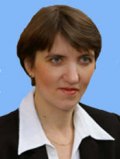 11.12.2009
11.12.2009
Урок английского языка в 9 классе
Тема урока: «С.В.Ковалевская»Цели урока: 1.Образовательные: развитие коммуникативной компетенции учащихся. 2.Развивающие: развитие познавательной активности, культурологического мышления учащихся. 3. Воспитательные: воспитание чувства любви к своей малой родине и чувства уважения к ее прошлому, стимулирование учащихся к общению. Оборудование: магнитофон, интерактивная доска, компьютер, мультимедийный проектор. Ход урока. Этап I. Организационный. Приветствие, ознакомление учащихся с темой урока, целями и задачами. Создание положительного эмоционального настроя. Teacher: -Good morning, children. How are you? P1: P2: Teacher: Where do you live, I wonder? P3: -I live in Russia. P4: -I live in Pskov Region, etc. Teacher: We live in one of the most beautiful places of Russia. We are also proud of great people who lived and worked here. S.Kovalevskaya was among them. What do you know about her? Ответы учащиеся готовили заранее, искали информацию в журналах, газетах, в Интернете. Варианты ответов: -She was the Great Russian mathematician. She spent her childhood in Polibino. It is not far from V.Luki. -She lived in Germany, in Paris, in Sweden. She couldn’t work in Russia perfectly well. -She wrote “The Woman Nihilist”. I’ve read it in Russian, etc. Этап II. Организация аудирования и контроль понимания услышанного. Учитель сообщает учащимся, что на уроке они подробнее познакомятся с жизнью и деятельностью С.В.Ковалевской. Учащимся предлагается прослушать текст на английском языке “S.V.Kovalevskaya”. Т.к. текст представляет некоторую сложность, необходимо выписать слова, затрудняющие его понимание, и фамилии выдающихся людей. Задавая затем вопросы классу, учитель осуществляет контроль понимания прослушанного. Answer the questions. 1. Where did Kovalevskaya spend her childhood? 2. Was she a gifted child? Can you prove it? 3. Why did Professor Tirtov call her a genius? 4. Why was it impossible for women in tsarist Russia to enter any higher school? Give your reasons. 5. Did Sophia graduate from the University? 6. Where did she work after the University? 7. S.Kovalevskaya wrote only scientific works, didn’t she? 8. Did she have literary talent? If yes, prove it. 9. When did Kovalevskaya die? 10. Have you read any books written by S.Kovalevskaya? What are they? Этап Ш. Чтение дополнительного материала “Some More Facts About S.Kovalevskaya” и организация беседы по теме. На данном этапе урока используется компьютер, мультимедийный проектор и интерактивная доска. Учитель осуществляет показ слайдов. Этап IV. Упражнения на закрепление языкового материала. 1. Match the words and phrases with their Russian equivalents. 1. philosophical story a) детство 2. a gifted child b)настаивать 3. to get a job c) разрешить проблему 4. salary d) заканчивать институт или университет 5. to live in poverty e) уехать за границу 6. to compose f) быть востребованным 7. to be required g) философская повесть 8. estate h) одаренный ребенок 9. childhood i) жить в бедности 10. to be astonished j) сочинять 11. to insist on k) поместье, имение 12. to be admitted l) быть признанным 13. to solve the problem m) изумляться 14. a degree n) ученая степень 15. to graduate from o) доход, зарплата 16. to go abroad p) получить работу 2. Make the sentence from the words given. - novelist, Russian, mathematician, she, was, and. - degree, her, was, she, in, 1847, granted, by, doctor’s, Gottingen University. - any, school, higher, was, it, for, a, impossible, to, enter, woman. - she, loved, in, the park, walk, to, about, things, different, thinking. - Kovalevskaya, the problems, many, which, solved, had failed, many, scientists, years, during, to solve. Этап V. Выполнение теста. 1. S.Kovalevskaya is an outstanding mathematician of the … . a) 17th century b) 18th century c) 19th century 2. Where was she born? a) in Moscow b) in Polibino c) in Pskov 3. What was her father’s surname? a) Kovalevsky b) Krukovsky c) Schubert 4. What subject did she study on her own when she was 14? a) literature b) trigonometry c) philosophy 5. Why did she go abroad to continue her education? a) she didn’t like Russia b) she wanted to work abroad c) Russian universities didn’t admit women 6. What was Karl Weierstrass? a) a great German traveler b) a great German writer c) a great German mathematician 7. What did Goettingen University grant her a PhD for? a) for her paper “On the Theory of Partial Differential Equations” b) for her doctoral dissertation 8. What happened to her husband in 1883? a) he was shot b) he committed suicide c) Sophia left him 9. Where were Kovalevskaya’s years the most fruitful of her scientific career? a) in Germany b) in Russia c) in Stockholm 10. Here is Kovalevskaya’s personal motto. Continue it. “Say what you know, do what you must, … . 11. When and where did she die? a) in Sweden in 1891 b) in Polibino in 1891 c) in Germany in 1889 12. How many papers on mathematics and mathematical physics did she publish? a) 10 b) 15 c)7 13. Compare the two parts of the following. A. the play B. “A Nihilist Girl” a short novel “The Struggle for Happiness” a radical political work “ Vera Barantzova” 14. What work did she write together with her friend Anna Leffler? 15. Where is Kovalevskaya Fund? a) in Russia b) in USA c) in Germany Этап VI. Подведение итогов урока. Домашнее задание. Возможные варианты домашнего задания: 1. Перевод на русский язык информации о С.В.Ковалевской, представленной в Международном издании Американской энциклопедии. 2. Перевод на английский язык строк из стихотворения Фрица Лэффера «На смерть Ковалевской»: Душа из пламени и дум, Пристал ли твой корабль воздушный К стране, куда парил твой ум, Призыву истинно послушный? В тот звездный мир так часто ты На крыльях мысли улетала, Когда, уйдя в свои мечты, О мирозданье размышляла.
Архив »»
|

